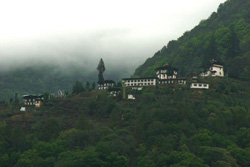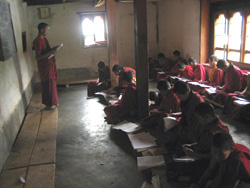In the second of her monthly diaries, Shiriin Barakzai describes the significant challenges she faces in teaching English to her classes of Bhuddist monks, starting with how to move on from rhythmic chanting...
In July I spent a week in Punakha and taught at the monastery nearly every day, twice a day. I rotated around the three classes to see how they were being taught and to assess their level of English. It was also a chance to try and understand some of the fundamental differences between my world view and theirs.
Traditional monastic studies are so different from ‘modern’ teaching that it’s quite difficult to get the students to speak at all, as they are so used to doing everything together in unison. If we are reading around the class, they will first stand and rearrange their robes before they start, so getting through a short book, with everyone reading a couple of lines, can take quite a while.
Traditional monastic studies involve reading and learning Tibetan and Sanskrit scriptures by heart. The monks are split into classes, where they all read together; their steady and regular chanting is either very calming or soporific, depending on your viewpoint! However, this doesn’t lend itself well to reading English clearly, annunciating vowels and consonants and using inflection to convey expression or emphasis. It also means words and sentences all run into each other and are spoken in a flat and droning voice.
 |
Bhutanese society in general is very hierarchical and so young or junior people will look at the floor and place their hand over their mouths when they speak to avoid contaminating the air their superiors are breathing. This is not handy when trying to hear what a student is saying, especially with the flat, droning tone.
And last but not least, beating students with a rhino hide whip is the norm: for falling asleep, not sitting up, not chanting loudly enough, etc. This is not unique to Bhutan, most Buddhist teaching involves some sort of corporal punishment, as does ‘mainstream’ teaching in the Indian subcontinent. Obviously I don’t beat anyone, but now and then I notice someone flinch if I move too fast to turn their page or reach for their pen.
So these are the first, most obvious challenges to overcome, added to the fact that the monks are awake from 4:30am until 10:00pm, so at least one young monk nods off in each class.
As noted in my last diary entry, the students' normal teachers have received limited English tuition themselves and so I really wanted to access some materials which they could use to guide them now and in the future. I found some material in the Teaching English supplement of my weekly paper, but mostly it was too advanced even for the class A students. We once spent four sessions reading the content of what was labelled a ‘lower intermediate’ comprehension and another two sessions answering the questions! Apart from the language used in the material, the context and concepts are so far removed from life here that they take a bit of imagination to explain, e.g. trying to explain ‘surfing the net’ to students who have never seen a surfboard or anyone surfing, or have never used a computer and don't understand what ‘the net’ means.
 |
Most of the time, the principal, Lebeh Tshewang, sits in on the classes I teach and I find this very handy for translating to Dzongkha. Even though we have a Dzongkha-English dictionary, many concepts just don’t exist in Dzongkha, or because of the way the word has been used in a sentence, it doesn’t make sense if directly translated.
My friend Galey Tenzin, who lives in Punakha, usually joins me for a Sunday class; we split up and he takes the younger students. Although the national language is Dzongkha, many people from the south of Bhutan speak Nepali and those from the east speak Sharchop. He can speak all three. But the Dzongkha that the monks learn in scripture, based on Tibetan and Sanskrit, is quite archaic and most lay people struggle to read or understand it. So, although I’ve been here over two-and-a-half years, all my own attempts to learn any of the many languages have failed so far.



No comments yet